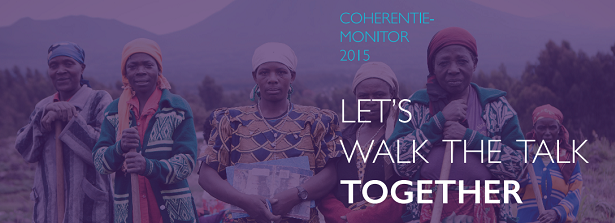Dutch policy coherence developments for food security

On June 16, 2015 an expert discussion on the Coherence Monitor 2015 Let’s Walk the Talk Together (in Dutch) was held to inform Dutch Parliamentarians for further dialogue on coherence for development with the Dutch cabinet. This Monitor was offered to Minister Ploumen for Foreign Trade and Development by the Dutch NGOs’ umbrella organisation Partos, in March this year. It describes the intended and unintended impact of Dutch and European policies on developing countries and makes recommendations for the future.
The rather critical chapter on food security suggested there is insufficient balance between Dutch knowledge and expertise in the field of energy-intensive, external-input dependent, large scale farming, livestock and export value chains on one side, and local food security, eco systems and needs of small scale farmers in developing countries on the other. Related to this imbalance, according to Partos, there are the following incoherence issues within food security, but also in the broader agriculture, investment and trade policies: The danger of one-sided focus on production increase; Shrinking budget in favour of enterprises; risk of land grab; Too strong focus on agro-industrial agriculture; and A lack of criteria for sustainable and inclusive policy.
In her written reaction sent to parliament in May, Minister Ploumen underlined the importance of interdepartmental cooperation and her willingness to anchor coherence in her policy, also supported by an annual coherence report. However, concerning food security in particular, Ploumen stated that in her new policy letter many of the incoherencies have already been addressed; Interventions are coherently focused on nutrition of the most vulnerable, development of small-scale farming and the sustainability of local food systems. Support from the Netherlands for inclusive and sustainable interventions that meet voluntary guidelines for responsible management of land rights and principles for responsible investments in agriculture and food systems are mentioned as an example of this.
During the parliamentary procedure, co-author of the Monitor Barbara van Paassen of ActionAid Netherlands reiterated that policy incoherence leads to unsustainable food production and consumption. There are still 800 million hungry and 2 billion undernourished while enough food is produced to nutritiously feed the world’s population. As a result, she argued that local producers, contexts and needs should be the starting point for food security policy. For example, Climate Smart Agriculture, contested on its sustainability in the Monitor, has the potential but does not start from the perspective of local situations. Also, impact on food security of policies of other ministries should be taken into account.
Parliament member Teeven (VVD) wondered if Dutch businesses could play a role. Miss Van Paassen responded that there are immense chances in supporting local producers that are often more productive, sustainable and inclusive than large enterprises. However, Dutch investors often do not reason from local needs yet. This ties with other calls of the Monitor to make sure that trade and investment policy does not undermine interest of small-scale farmers and to support corporate social responsibility of Dutch enterprises. This could be supported by integral food policy beyond sector boarders that connects sustainable production and consumption worldwide, based on food systems in which human rights are central, says Partos in the Monitor.
Parliament members will consider the input given in their preparations for amongst other things the yearly debate on the national budget and the debate on the new policy letter on food security, in which Minister Ploumen will elaborate more on her policy later this year.





